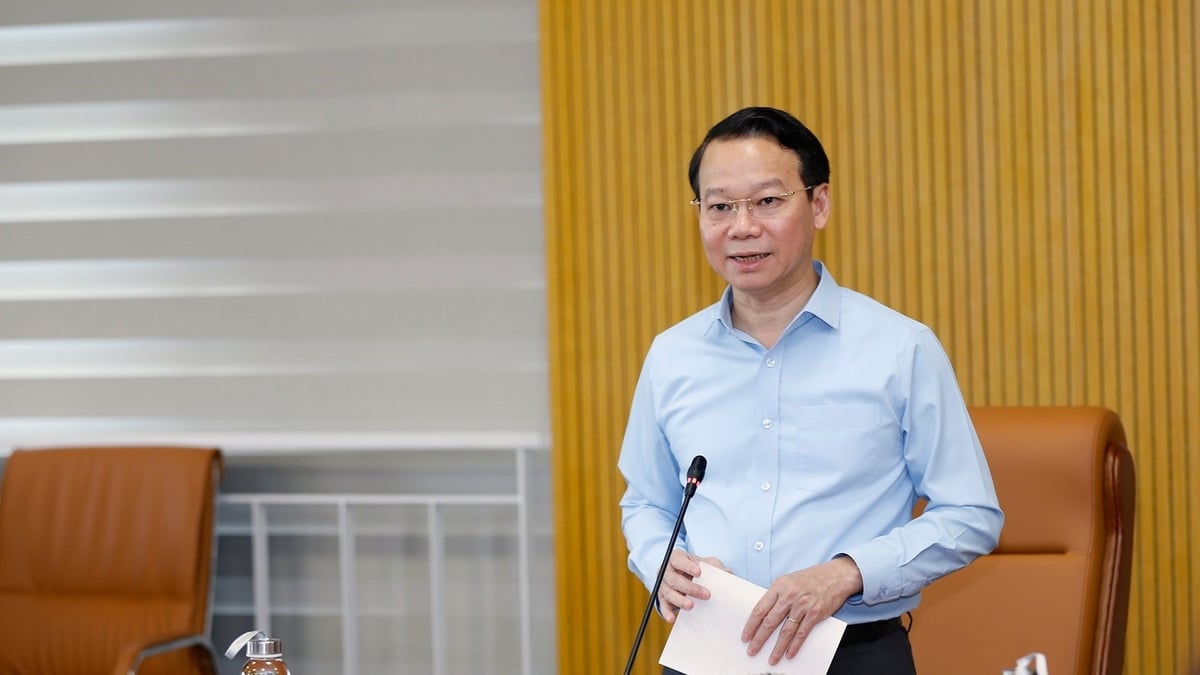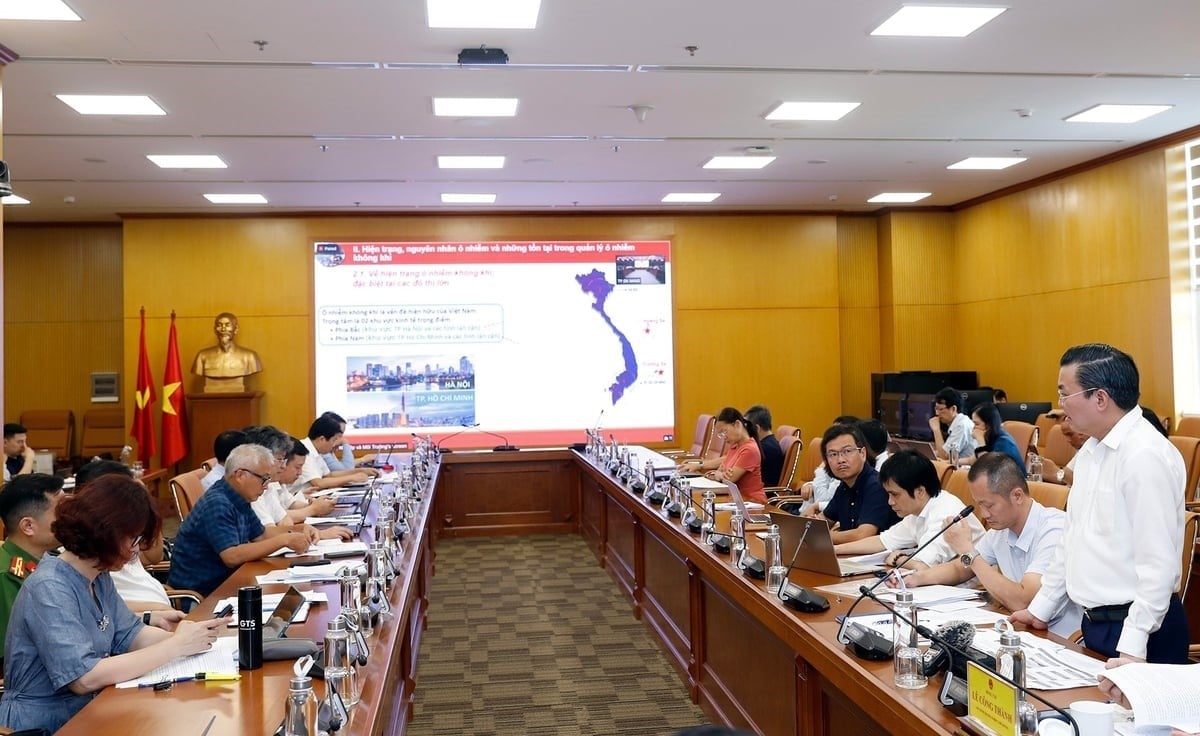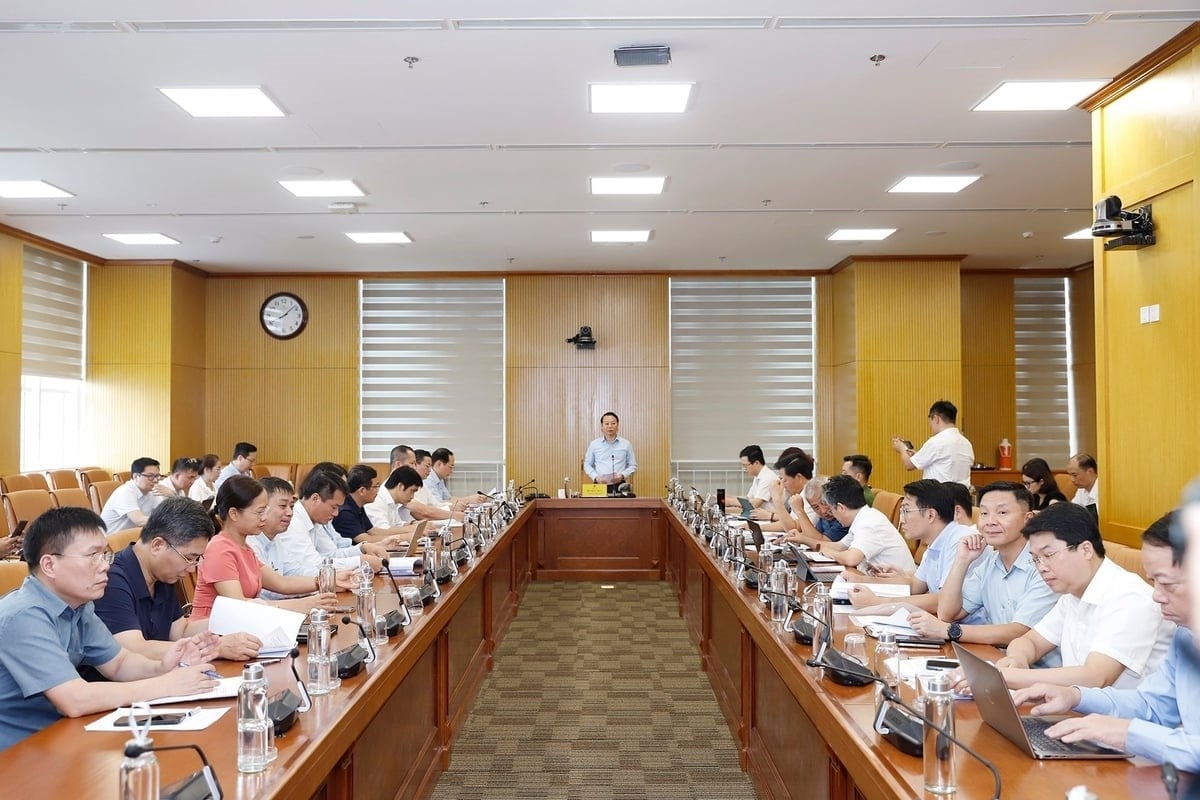December 5, 2025 | 05:26 GMT +7
December 5, 2025 | 05:26 GMT +7
Hotline: 0913.378.918
December 5, 2025 | 05:26 GMT +7
Hotline: 0913.378.918
The conference brought together the working delegation to consult opinions and finalize the draft National Action Plan on Air Pollution Mitigation and Air Quality Management for the 2025–2030 period. The aim is to get opinions of relevant units and competent authorities to finalize the draft plan before submitting it to the Prime Minister for approval in the near future.

Minister Do Duc Duy delivered the opening speech at the conference on consulting opinions and finalizing the draft National Action Plan on Air Pollution Mitigation and Air Quality Management for the 2025–2030 period. Photo: Khuong Trung.
Speaking at the conference, Minister of Agriculture and Environment Do Duc Duy emphasized the particular significance of controlling and improving air quality in the current context of socio-economic development.
According to Minister Do Duc Duy, environmental pollution in general and air pollution in particular remain major challenges in large cities. Leaders of the Party and State, especially General Secretary To Lam and Prime Minister Pham Minh Chinh, have repeatedly stressed the need for synchronous and fundamental solutions to address this issue, particularly in their working sessions with the Hanoi Party Committee and the Coordinating Council for the Red River Delta Region.
In reality, Ministries and localities, such as Hanoi and Ho Chi Minh City, have implemented various measures to control and tackle air pollution. However, the outcomes have yet to meet the established targets.
In recent times, the Ministry of Agriculture and Environment (MAE) has chaired many collaborative activities, such as the workshops with the National Assembly's Committee on Science, Technology and Environment and the Hanoi City People's Committee, and most recently, the workshop held at the National Assembly Building in April to discuss solutions for air pollution control in large cities.
Previously, the Government had assigned the Ministry to develop a plan for addressing urban air pollution. However, based on the recommendation of Deputy Prime Minister Tran Hong Ha, the direction was adjusted toward building a National Action Plan to ensure the spirit of decentralization. Specifically, local authorities are empowered to decide and take responsibility for implementation, while the Central Government develops the strategic framework and provides technical and institutional support.
During the process of developing the draft plan, the MAE closely collaborated with experts, scientists, ministries, branches, and international organizations. Key contents were reported to the Deputy Prime Minister on March 27, 2025. The draft plan has been developed based on domestic practical research, international experience, and feedback from Ministries, branches, and experts. Its core focus is to forecast environmental pressures over the next 5-10 years in order to identify urgent and decisive tasks to curb the rise in pollution.

The Vietnam Environment Administration reported on air pollution mitigation and air quality management for the 2025–2030 period. Photo: Khuong Trung.
Minister Do Duc Duy emphasized that controlling air pollution is an urgent requirement for the entire political system, especially as Vietnam enters a new phase of development with the goal of achieving double-digit economic growth.
Lessons from developed countries show that the transition from a developing to a developed nation is also the period of greatest environmental pressure, during which emission rates are typically 1.5 times higher than GDP growth. Without effective control measures implemented now, the cost of addressing the future consequences will be extremely high.
A notable example mentioned was Beijing (China), a city that once suffered from pollution levels that were even more severe than those of Hanoi today. However, thanks to substantial investments amounting to billions of USD and the implementation of synchronous solutions, Beijing's air quality has been improved remarkably. This illustrates that early investments with the correct direction can help reduce costs and achieve higher efficiency in the long term.
At the conference, the MAE called for feedback from delegates on three main contents:
First, regarding the assessment of causes of air pollution in the draft plan, delegates need to consider the accuracy and completeness of the findings and to distinguish between primary and secondary causes to provide a basis for building appropriate solutions. Several reasons mentioned include emissions from vehicles, construction activities, burning of agricultural by-products, and industrial zones’ activities.
Second, regarding solutions, the Ministry's specialized agencies presented air pollution control and mitigation measures to delegates. The Minister suggested delegates offer further opinions to clarify the feasibility, effectiveness, and comprehensiveness of the proposed solutions, from infrastructural to non-infrastructural, from policy mechanisms to communication and education.
Third, regarding implementation responsibilities, who will implement, when, and with which resources are particularly important contents in the current directive that localities are responsible for implementation. Accordingly, the Central Government is responsible for strategic planning, institutional development, and investment in monitoring, forecasting, and data systems as the foundation for management, while local governments at all levels will be in charge of direct implementation.
The Minister provided a specific example regarding traffic emission control: effective control requires a vehicle inspection system, established standards, and certified monitoring equipment. Similarly, transitioning to green transport requires support policies and a clear roadmap, from restricting gasoline-powered vehicles to encouraging the use of electric vehicles. Ho Chi Minh City has already taken initial steps by supporting technology-based vehicles, which are a group moving frequently in the city, in converting to electric ones.

Overview of the conference. Photo: Khuong Trung.
Minister Do Duc Duy also paid special attention to the requirement for concrete results. For example, in Hanoi, the peak period of air pollution typically spans from October to April of the following year, coinciding with the time the country prepares to host major national events. Therefore, clear targets must be set: by the end of this year, air quality in the capital must show improvement compared to the beginning of the year, and next year must be better than the last. This is a critical phase as the country enters a new era of development, and the image of a smog-covered capital must no longer persist as in previous years.
This conference gathers numerous representatives from Ministries and branches, notably the Ministry of Public Security, as well as delegates from localities directly responsible for implementing the tasks outlined in the plan. The MAE wished to receive frank, constructive, and practical feedback to finalize the draft plan soon and submit it to the competent authorities for approval and nationwide implementation.
“We must act immediately, act correctly, and act responsibly because the air quality of today is the health and sustainable development of our country tomorrow,” Minister Do Duc Duy emphasized.
Translated by Thu Huyen
/2025/12/02/2629-3-141849_60.jpg)
(VAN) Based on its large-scale planted forests, several rubber enterprises have proactively conducted greenhouse gas emission inventories in preparation for entering the forest carbon credit market.

(VAN) MAE is leading in developing a national rare earth strategy, which will be submitted to the competent authorities for promulgation in early 2026.
/2025/12/02/4006-4-092040_652.jpg)
(VAN) The model of converting low-efficiency rice land to aquaculture in many localities has helped increase incomes by 5 to 15 times, improve the environment, and form new fisheries economic zones.

(VAN) Funded by ACIAR, Project FST/2020/123 focuses on measures to prevent harmful alien species, thereby protecting forests from invasive threats.

(VAN) The National Assembly's Supervisory Delegation pointed out solutions for the blue economy, circular economy, environmental protection, and technology application for sustainable marine governance.

(VAN) Lao Cai’s forestry sector is stepping into the spotlight with a series of pioneering initiatives in forest management, monitoring, and sustainable development aimed at generating carbon credits.

(VAN) The Provincial Competitiveness and Governance Index (PCGI) is a tool designed to reflect the quality of local governance.